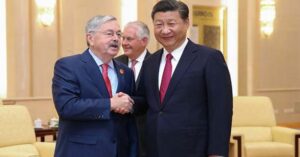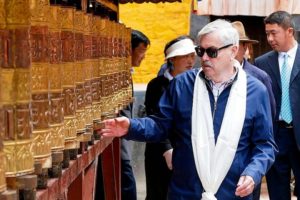 The United States Ambassador to China, Terry Branstad, was granted a visit to Tibet from May 19 to 25, the first time that US ambassador has visited the region since 2015 – despite requests being made for visits in the meantime. The visit has hit the international news media and is seen as a result of the new Reciprocal Access to Tibet Act which was recently passed into US law and will mean that Chinese officials who implement restrictions on access for foreigners to Tibet will themselves be denied visas to visit the US – a law which China has denounced.
The United States Ambassador to China, Terry Branstad, was granted a visit to Tibet from May 19 to 25, the first time that US ambassador has visited the region since 2015 – despite requests being made for visits in the meantime. The visit has hit the international news media and is seen as a result of the new Reciprocal Access to Tibet Act which was recently passed into US law and will mean that Chinese officials who implement restrictions on access for foreigners to Tibet will themselves be denied visas to visit the US – a law which China has denounced.
Reuters said that the visit comes “amid escalating trade tension between the two countries” and quoted a US Embassy spokeswoman as saying, “This visit is a chance for the ambassador to engage with local leaders to raise longstanding concerns about restrictions on religious freedom and the preservation of Tibetan culture and language”.
The Tibetan Review reported that China expected Mr Branstad to “conform to its propaganda claim that all was well in Tibet under its rule”.

US Ambassador to China Terry Branstad rotates prayer wheels in Lhasa on May 23.
Photo:thepublicsradio.org
During his visit, Mr Branstad’s call to China to reopen talks with representatives of His Holiness the Dalai Lama regarding the situation in Tibet were reported in the international media. The Hong Kong Free Press reported on the visit under the headline “US ambassador urges Beijing to open ‘substantive dialogue’ with Dalai Lama”, while Time, under the headline US Ambassador Urges China to Meet With Dalai Lama in Rare Visit to Tibet, said that Terry Branstad also “expressed concerns regarding the Chinese government’s interference in Tibetan Buddhists’ freedom to organise and practice their religion” as well as concern about the lack of access to the Tibet Autonomous Region. Time reported that he visited important religious and cultural sites and met “senior Tibetan religious and cultural leaders”. The South China Morning Post, the most independent Chinese news site, said “Talk to the Dalai Lama, US ambassador urges China on rare trip to Tibet. Terry Branstad also raises long-standing concerns about the lack of access to the autonomous region”.
The only reported response from China to date has been their usual statement, this time made by Chinese government spokesperson Lu Kang on May 28, that Beijing “firmly opposes any foreign interference in Tibet affairs in China’s domestic affairs.”




 Print
Print Email
Email